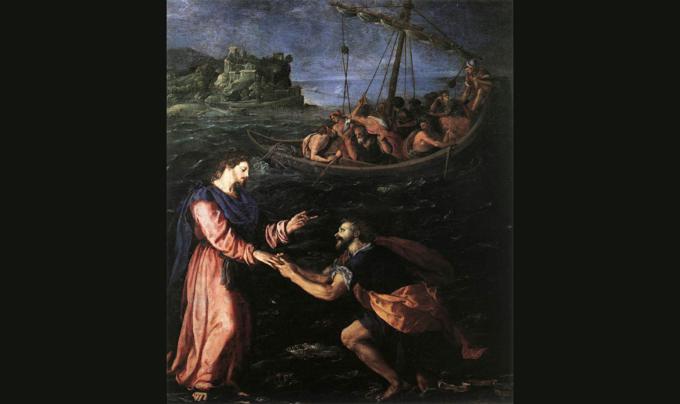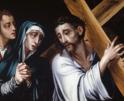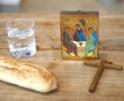
Spirituality
The post-resurrection narratives illustrate the dynamics of faith pretty clearly: You believe it. Then you distrust. Then you believe it again. At least, so it seems on the surface.

Rolheiser
The poet, Rumi, suggests that we live with a deep secret that sometimes we know, then not, and then know again. That's a good description of faith. Faith isn't something you nail down and possess once and for all. It goes this way: Sometimes you walk on water and sometimes you sink like a stone.
The Gospels testify to this, most graphically, in the story of Peter walking on the water: Jesus asks Peter to step out of a boat and walk across the water to him. At first it works, Peter, unthinking, walks on the water, then becoming more conscious of what he is doing he sinks like a stone. We see this too in the massive fluctuations in belief that Jesus' disciples experience during the "forty days" after the resurrection. Jesus would appear to them, they would trust he was alive, then he would disappear again, and they would lose their trust and go back to the lives they'd led before they met him, fishing and the sea. The post-resurrection narratives illustrate the dynamics of faith pretty clearly: You believe it. Then you distrust. Then you believe it again. At least, so it seems on the surface.
We see another example of this in the story of Peter betraying Jesus. In Mark's Gospel, Jesus tells us that there is a secret which separates those who have faith from those who don't: To you is given the secret of the kingdom, but to those outside everything exists in parables. That sounds like Gnosticism, that is, the idea that there's a secret code somewhere (e.g., The Di Vinci Code) that some know and some don't and you are in or out depending upon whether you know it or not. But that's not what Jesus is saying here. His secret is an open one, accessible to all: the meaning of the cross. Anyone who understands this will understand the rest of what Jesus means, and vice versa. We are in or out, depending upon whether or not we can grasp and accept the meaning of Jesus' death.
But, being in or out isn't a once and for all thing. Rather, we move in and out! After Peter denied Jesus, we're told: "he went outside". This is intended both literally and metaphorically. After his denial, Peter stepped outside a gate into the night to be away from the crowd, but he also stepped outside the meaning of his faith.
Our faith also bounces up and down for another reason, we misunderstand how it works: Take for example the Rich Young Man who approaches Jesus with this question: "Good master, what must I do to possess eternal life?" That's an interesting choice of a verb: to possess. Eternal life as a possession? Jesus' gentle correction of the young man's verb teaches us something vital about faith. Jesus says to him: "Now if you wish to receive eternal life", meaning that faith and eternal life are not something you possess so that they can be stored and guarded like grain in a barn, money in a bank, or jewelry in a box. They can only be received, like the air we breathe. Air is free, is everywhere, and our health doesn't depend upon its presence, for it's always there, but rather upon the state of our lungs (and mood) at any given moment. Sometimes we breathe deeply and appreciatively; but, sometimes, for various reasons, we breathe badly, gasp for breath, are out of breath, or are choking for air. Like breathing, faith too has its modalities.
And so, we need to understand our faith not as a possession or as something we achieve once and for all, which can be lost only by some huge, dramatic, life-changing shift inside of us, where we move from belief to atheism. "Faith isn't some constant state of belief," suggests Abraham Heschel, "but rather a sort of faithfulness, a loyalty to the moments when we've had faith."
And that teases out something else: To be real, faith need not be explicitly religious, but can express itself simply in faithfulness, loyalty, and trust. Fox example, in a powerful memoir written as she as dying of cancer, The Bright Light, Annie Riggs shares her strong, but implicit, faith as she calmly faces her death. Not given to explicit religious faith, she is challenged at one point by a nurse who says to her: "Faith, you gotta have it, and you're gonna need it!" The comment triggers a reflection on her part about what she does or doesn't believe in. She comes to peace with the question and her own stake in it with these words: "For me, faith involves staring into the abyss, seeing that it is dark and full of the unknown - and being okay with that."
We need to trust the unknown, knowing that we will be okay, no matter that on a given day we might feel like we are walking on water or sinking like a stone. Faith is deeper than our feelings.
- Oblate Father Ron Rolheiser, theologian, teacher, and award-winning author, is President of the Oblate School of Theology in San Antonio, TX. He can be contacted through his website www.ronrolheiser.com.
Now on Facebook www.facebook.com/ronrolheiser
Recent articles in the Spirituality section
-
No line-drawingMichael Pakaluk
-
Physician-assisted suicide is a slippery slopeCardinal Seán P. O’Malley
-
He saw the cloths and believedBishop Robert Barron
-
God's instrument for viewing the crucifixionMichael Pakaluk
-
QuinquagesimaMichael Pakaluk


















